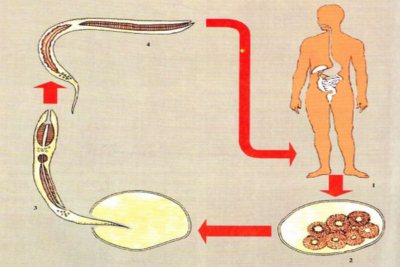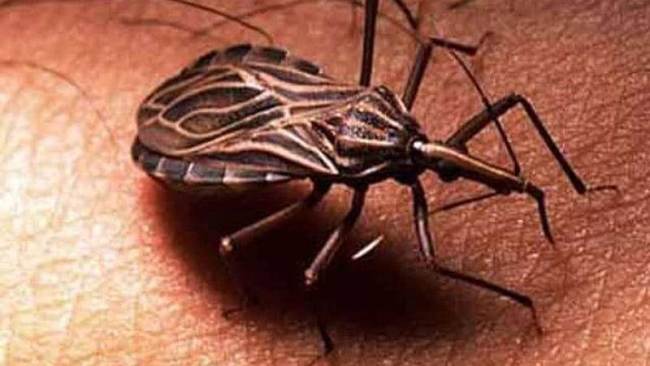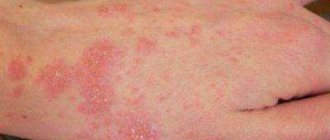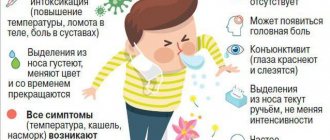08.02.2017
The occurrence of allergic reactions is usually associated with food, pollen, dust particles, and insects. Few people know that discomforting symptoms (itching, skin rashes, cough, dermatitis) can be caused by parasites. A tenth of the 250 species of helminths that can settle in the human body pose a serious threat to health. Allergies from worms are usually detected when visiting a dermatologist, after undergoing laboratory tests. Its manifestations differ from person to person depending on the state of health, the type of helminthiasis, and are often mistaken for ordinary fatigue, vitamin deficiency, or a cold.
An allergic reaction may also be due to parasites
Loading …
How is allergies related to worms?
In response to the appearance of foreign cells, which sometimes do not pose a danger, the body reacts by releasing special antibodies. An allergic reaction is also caused by parasites that settle inside a person. The reasons for its occurrence are damage by worms to the tissues of internal organs, the influence of toxins released during the life of helminths, and decay products after their death. Thus, the symptoms that cause allergies and worms have much in common.
The penetration of larvae into the intestines or other organ occurs due to the enzymes they secrete, which can cause various inflammations. In addition, they help create the necessary conditions for the formation of an adult. Those, in turn, clog the body with metabolites.
Most helminths exist from 3 weeks to a year, which leads to allergies caused by the decomposition of dead worms. It has been noticed that the body’s response, which manifests itself in the process of treating helminthic infestations, is caused not by drugs, but by the mass death of parasites. Particularly severe intoxication occurs as a result of infection with roundworm, due to the outstanding size of the worm.

Allergies are caused by the decomposition of dead worms
Mechanical damage to organ tissue by parasites causes a particularly pronounced reaction. Many types of worms migrate with blood into the respiratory tract, provoking a strong cough, which should throw them into the oral cavity. When swallowed, the worms end up back in the digestive tract.
The presence of parasites in the lungs contributes to the development of bronchial asthma. While a cough provoked by worms is mistaken for a symptom of ARVI, the disease becomes chronic.
A local allergic reaction occurs as a result of infection with schistosomes and intestinal acne. Penetrating under the skin, they usually die without having time to develop into sexually mature individuals, provoking the formation of winding red lines, indicating traces of the movement of the larvae.
Infection of internal organs by worms is much more dangerous. It may be accompanied by cough and fever. Sometimes more serious reactions occur, causing death.
In addition to allergies to their own vital functions, parasites increase the human body’s susceptibility to other allergens – dust mites, plant pollen.
Can worms cause allergies in children and adults: relationship, symptoms and treatment
All kinds of allergic reactions, be it dermatitis, itchy skin, rhinitis or cough, are provoked, contrary to popular belief, not only by food, plant pollen or particles of dust and wool.
When such symptoms occur without corresponding diseases or the entry of allergens into the body, the cause of the immune response may be parasites - helminths and some types of protozoa.
Let's try to figure out how allergies from parasites manifest themselves in children and adults, what parasitic organisms can provoke it, and how to treat such allergies.
The mechanism of allergies
Any allergy, not counting hypersensitivity, is an immune response (the release of antibodies) to the introduction of antigens - foreign molecules - into the body. In most cases, antigens themselves do not pose any danger, and the body's protective reaction is erroneous.
One of the main “producers” of allergens (antigens that cause allergic reactions) are helminths and single-celled organisms. The causes of allergic reactions in this case are very diverse:
- excretion of waste products by parasites;
- decomposition of dead helminths;
- mechanical damage to tissue.
The first manifestations of allergies can be caused by worm larvae that secrete proteolytic enzymes and the enzyme hyaluronidase.
These enzymes cause inflammatory processes that help the larvae penetrate the desired organ (most often the intestines) and create ideal conditions for their development into adults.
Subsequently, when the larvae develop into adult helminths, the main cause of allergic manifestations is the metabolites (waste products) they secrete.
Since representatives of the most common types of helminths have a short life expectancy (from 3–4 weeks to a year), a little later the human body begins to suffer from the decomposition of dying parasites.
Thus, it is reliably known that most of the side effects that occur during the treatment of parasitic diseases are not caused by the anthelmintic drugs themselves, but by the mass death of worms that begin to be digested by the intestines.
Particularly severe intoxication can occur during the treatment of ascariasis, since the total weight of ascaris during intensive infestation can exceed 0.5 kg (the weight of a small mammal). Poisoning usually manifests itself in the form of urticaria (pictured below).
However, the most pronounced allergic reactions are a consequence of the mechanical effect of worm larvae (less often, adult individuals) on human tissue.
For example, ascaris larvae, after entering the intestines, penetrate the circulatory system, and from there into the liver, heart, lungs, and finally into the respiratory tract.
Their presence in the respiratory tract provokes a cough, which not only annoys a person, but also has its own function - it throws roundworm larvae into the oral cavity, where they must be swallowed again into the stomach.
Moreover, the presence of larvae in the lungs can provoke bronchitis or bronchial asthma. At the same time, cough (one of the main symptoms of these diseases) for a long time can be mistaken for an allergy or a manifestation of ARVI, while bronchitis or asthma will become a chronic condition, which is especially dangerous for children.
Another classic example is larva migrans syndrome. It involves the introduction of larvae of various types of helminths under the skin or into internal organs. The cutaneous form of the syndrome is caused by the larvae of schistosomes, hookworms, intestinal eelworms and some other worms.
Infection occurs either by walking barefoot on soil and sand, or by swimming in a contaminated body of water.
These larvae are not able to develop into an adult and therefore soon die, but they provoke the appearance of a local allergic reaction on the skin - red winding lines repeating the “route” of the larvae.
The visceral (visceral) form of the syndrome is much more dangerous, in which the larvae of Toxocara, Toxascar, sheep brainworms and other helminths infect internal organs. This is accompanied by severe allergic reactions: dry cough, fever, allergic exanthema, not to mention much more serious non-allergic symptoms that can lead to death.
In addition to allergic reactions caused by one’s own vital activity, some helminths make a person (most often children) more susceptible to completely foreign allergens.
For example, roundworms can cause allergies in humans to dust mites, northern shrimp and large daphnia (an almost ubiquitous freshwater crustacean).
The reason for this is the protein tropomyosin, which is present in all of these organisms, to which the immune system gets used to reacting as if it were an antigen. Similarly, as British scientists found in 2015, allergies to pollen and worms are also associated.
What types of parasites can cause allergies?
Generalized and simplified statements that parasites always cause allergic reactions are fundamentally wrong. On the contrary, over millions of years of evolution, helminths have learned several camouflage techniques:
- disruption of the functioning of T-helpers (immune cells responsible for recognizing antigens);
- transforming the molecular structure of its own proteins to the structure of the host's antibody proteins.
Parasitic life forces helminths to remain as secretive as possible, so cough, rhinitis, dermatitis, itching and other allergy symptoms appear only at certain stages of the helminths’ life cycle, most often in the first days after infection.
The cause of allergic reactions in both adults and children can be representatives of the following types of parasites:
- Roundworms. They enter the human body (most often children) through the fecal-oral route when consuming unwashed vegetables, fruits, herbs or unboiled water. Allergy symptoms: itching and rashes on the skin, cough, sputum production; allergies to dust mites, shrimp and daphnia.
- Trichinella. A person becomes infected through eating infected game or pigs. Allergy symptoms: skin itching, swelling, chills, fever, cough.
- Intestinal eels. The larvae of the parasite penetrate the skin on their own upon contact with the ground. Allergy symptoms: hives, itching, blisters, cough.
- Toxocars. Infection occurs through ingestion of parasite eggs in food and water contaminated with dog feces, as well as through contact with infected dogs. Allergy symptoms: severe cough, itchy skin rashes, puffy face, fever.
- Gnathostomas. A person becomes infected by consuming infested fish, frogs, birds and water; Less commonly, the larvae penetrate the skin. Allergy symptoms: rash, itchy blisters on the skin, swelling.
- Anisakids. People become infected by eating infected fish, and less commonly, squid and cuttlefish. Allergy symptoms: dermatitis, urticaria, anaphylactic shock.
- Various types of filariae. The larvae are carried by blood-sucking dipterous insects. Allergy symptoms: papular rash on the skin, itching, erythema, swelling of the face, fever.
- Lanceolate flukes. They enter the human body through accidental ingestion of infected ants with berries, vegetables, and herbs. Allergy symptoms: yellowing of the skin, acute urticaria.
- Heterophies. They infect humans through infected fish. Allergy symptoms: rash and fever.
- Chinese flukes. They infect humans through infected fish. Allergy symptoms: skin rashes and fever.
- Metagonims. They infect humans through infested fish or accidental ingestion of their scales. Allergy symptoms: skin itching and fever.
- Siberian flukes. They infect humans through infected fish. Allergy symptoms: hives, fever, jaundice, cough.
- Pulmonary flukes. They infect humans through infested crayfish and crabs. Allergy symptoms: itchy skin, fever, cough.
- Liver and giant flukes. They enter the human body with contaminated plants or water. Allergy symptoms: skin rash, cough, fever.
- Fasciolopsis. People become infected by consuming infested aquatic plants or water. A symptom of an allergy is swelling of the face.
- Schistosomes. They infect humans by independently penetrating their body through the skin. Allergy symptoms: spotty skin rash, hives, severe itching, dry cough, fever.
- Larvae of echinococci and alveococci. Parasite eggs enter the human body through contact with infested dogs or consumption of food and water contaminated with their feces. Allergy symptoms: fever, chills, jaundice, cough, itching, swelling of the lips and eyelids, rhinitis, anaphylactic shock (depending on where the parasites have settled and where they give larval metastases).
- Wide tape. A person becomes infected by eating infected fish. Allergy symptoms: hives and swelling in the legs.
- Bull tapeworm. Infection occurs through consumption of infested beef. A symptom of an allergy is hives.
- Larvae of Spirometra erinaceieuropaei. Infection occurs through the consumption of frogs and snakes or the accidental ingestion of certain types of crustaceans in water. Allergy symptoms: formation of red and itchy subcutaneous nodules, painful swelling.
- Giardia. They infect humans (most often children under 4 years of age) through the fecal-oral route through cyst-contaminated agricultural products, water or hands. Allergy symptom is atopic dermatitis.
Treatment
It makes sense to treat allergic manifestations only against the background of treatment of helminthiasis itself. Suspicion of helminthic infestation should arise if dermatitis, skin itching or swelling suddenly appeared in a person who has never suffered from allergies.
In this case, you should take tests prescribed by your doctor (stool, blood, sputum, etc.). However, you cannot rely entirely on the tests.
Firstly, many parasites that cause allergies (for example, intestinal acne) secrete eggs irregularly, which makes diagnosis very difficult and requires multiple repetitions of the analysis.
Secondly, as doctors themselves admit, in public clinics doctors are able to recognize eggs of only 3-4 of the most common types of helminths. In this regard, it may be more reasonable to take tests in paid private clinics and laboratories, where, moreover, a much more accurate enzyme-linked immunosorbent assay has long been adopted.
To remove most of the above helminths, the universal drugs albendazole and praziquantel are used.
However, taking them before an accurate diagnosis of helminthiasis is highly not recommended due to strong side effects and destructive effects on the liver - especially in a child.
If tests do not reveal the presence of helminths, and allergic symptoms do not subside, you can undergo a course of deworming with traditional medicine - both home-made and purchased. Both are prepared from centuries-tested anthelmintic herbs, but ready-made preparations give the best effect due to the combined composition of 10–15 antiparasitic plants.
If the indicated dosages are observed, herbal remedies are safe even for small children.
In some cases - for example, when a child has a hard time tolerating allergic reactions or they are life-threatening - separate symptomatic treatment may be necessary.
For this, corticosteroid ointments are used (for dermatitis), antihistamines (for Quincke's edema or anaphylactic shock), antitussives and mucolytics (for cough and sputum).
However, it should be remembered that many of these drugs are contraindicated for children.
Reviews about the treatment
The following few reviews, taken from various forums, are intended to show how closely allergies and parasites are related.
Evgenia: “While I was suffering from opisthorchiasis, I had a severe allergy to any alcohol and coffee. I got tested, was treated with Biltricide, and the allergy disappeared without a trace. Along with opisthorchiasis, the child developed an allergy to poplar fluff and dust, but it never went away after the parasites were removed.”
Anatoly: “Unexpectedly, I got rid of severe eczema when I cured ascariasis. Later, the infectious disease specialist explained that the increased production of histamine, which leads to allergies, is precisely the influence of worms.”
Anastasia: “For a long time I suffered from a terrible allergy to dust and animal hair, but all symptoms disappeared after deworming with bitter herbs.”
Olga: “A four-year-old child developed an incessant cough after playing in the sand every day. I didn’t connect this with parasites in any way until I found out that it is the roundworm larvae, which children become infected with through sand and soil, that irritate the respiratory tract.
After taking Pirantel, the child’s cough immediately stopped.”
Almost every of the most common helminthiases can cause allergic reactions: from relatively harmless dermatitis and cough to deadly angioedema or anaphylactic shock.
Moreover, as recent studies demonstrate, helminths can provoke allergies to completely foreign substances and products.
And due to the fact that many ordinary doctors are not aware of this, if allergic reactions occur “for no reason,” you should undergo the necessary tests yourself and, if possible, undergo preventive treatment.
Source: https://gelmintov.net/oslozhneniya/allergiya-ot-glistov.html
Parasites are the culprits of allergies
Whether worms can cause allergies depends on a person’s genetic predisposition, existing diseases and the type of parasites that have settled in the body. The last factor also influences the characteristics of the symptoms that appear. What types of worms contribute to allergies:
- Roundworms. Helminths that secrete substances that cause rashes, coughs, lacrimation, and allergic conjunctivitis. Infestation occurs as a result of consumption of contaminated agricultural products and raw water.
- Pinworms. Infection provokes a skin rash and an increase in the number of eosinophils.
- Trichinella. Symptoms are swelling of the skin, itching, allergic cough, fever, increased body temperature.
- Intestinal eels. They get under the skin when working with soil, causing hives and blistering.
- Toxocars. The source of infection is contaminated food and water. Symptoms include rashes, fever, and severe cough. Puffiness on the face is often observed.
- Filaria. The parasite larvae are carried by blood-sucking insects. As a result of the invasion, a papular rash occurs, accompanied by itching, erythema, and swelling on the face.
- Lanceolate flukes. They penetrate into the human stomach with infected ants when they are accidentally ingested. The allergy is expressed by urticaria and yellowness of the skin.
- Chinese flukes and heterophyes. Infection occurs through fish infected with helminths. Allergic symptoms manifest themselves in the form of fever and skin rash.
- Pulmonary flukes. The body reacts to helminths with cough, itching, and fever.
- Echinococcus. Penetration of parasite eggs into humans occurs through contact with an infested dog, through products contaminated with dog feces. An allergy occurs when a cyst ruptures and its contents are absorbed into the blood. A cough caused by helminthiasis is accompanied by chills and fever. The patient experiences severe swelling in the lips and eyelids, jaundice, itching, rhinitis, and possible anaphylactic shock.
- Bull tapeworm. A characteristic reaction of the body is urticaria. The cause of infection is the consumption of infested meat that has not undergone high-quality processing.
- Wide tape. In addition to hives, swelling in the legs may occur.
- Giardia. Most often, children under 4 years of age suffer from infection. Infection occurs through dirty hands, water, and unwashed vegetables. The main allergic symptom caused by Giardia is atopic dermatitis.
Parasites manifest themselves in different ways
In the process of evolution, helminths have adapted to mask their presence in the body, so allergic symptoms occur only at a certain stage of parasite development.
Symptoms of allergies from worms, what parasites can cause it
In the event of allergic reactions of unknown origin, one must be inclined to think that it is an allergy from worms.
Its diagnosis in most cases is carried out by a dermatologist or allergist after a person comes to them with a rash that causes discomfort.
It should be noted that the allergens of roundworms, echinococci and trichinella are usually classified as infectious allergens, but their larvae are considered the most active.
Classification of helminth allergens
All allergens secreted by worms that cause allergies are usually divided into:
- Exogenous. This type of allergen is produced by parasites as a result of their vital activity. Sensitization of the host organism occurs. Symptoms of the formation of reactions of allergic origin appear.
- Endogenous. These allergens appear as a result of the decay of parasites.
As a result, a person begins to experience allergy symptoms such as:
- increased level of eosinophils;
- feeling of itching of the skin;
- rash of various nature and localization;
- bronchospasm;
- formation of light infiltrates in the lumen.
The influence of parasites on the human body
Despite the fact that helminths are localized in certain organs, in the process of their life activity and reproduction they have a negative impact not only on them, but also on the entire body.
By damaging tissues, parasites contribute to the entry of infection into the body and the development of inflammation.
What complications does helminthic infestation cause? It could be:
- carcinogenesis;
- intoxication of the body;
- anemia;
- insufficient supply of nutrients and vitamins to the body;
- disruption of the functioning of the digestive system;
- allergic reactions.
But at the same time, the greatest blow provoked by helminths is experienced by the human immune system.
What worms can lead to the development of allergies?
Some people experiencing allergies may wonder whether worms can cause allergies in the human body. In response, we can say that everything will depend on the parasite, the individual characteristics of the body, the predisposition to allergic reactions, as well as the presence of concomitant diseases, for example, allergic dermatitis.
Now let’s look at some helminths as an example:
- Pinworms. Clinically, itching in the anal area appears, caused by these parasites, especially at night or in the morning. An allergic reaction is manifested by the appearance of rashes, which can be of a different nature, and an increase in the number of eosinophils in the blood.
- Roundworms. Bronchospasm and conjunctivitis caused by roundworms appear, which is accompanied by lacrimation and a rash.
- Cat fluke. When parasitized by these helminths, a large amount of toxic substances enter the bloodstream, which are released during the life and reproduction of these parasites. As a result, allergies may develop in the form of urticaria.
- Bull tapeworm. If this worm is present in the body, pathological symptoms such as:
- hydrocephalus;
- rash of various nature and localization;
- epileptic seizures.
- Trichinella. In this situation, an allergy appears as a result of sensitization of the body to the decay products of helminths and their larvae. Symptoms such as:
- increased body temperature;
- rash on the skin, which occupies a large area;
- swelling of the skin, which can have any localization.
- Echinococcus. This worm has the ability to stay in the human body for a long time without showing any symptoms. But at a certain moment, the cyst ruptures, which contains the waste products of these worms and is absorbed into the bloodstream. As a result, we get an allergic reaction, which will be accompanied by tissue swelling, bronchospasm and skin rash.
Reasons for the lack of an immune response to helminths entering the body
As already noted, there are parasites that, having penetrated the body of adults, may not manifest themselves in any way.
It would seem that this should not happen, because the immune system would have to resist the penetration of parasites with manifestations and reactions that would cause the death of helminths.
But there are cases when such reactions do not occur. This is because parasites have acquired properties that allow them to suppress the host’s immune system.
They have the ability to disrupt the functioning of the human body's immune system.
After lengthy research, experts were able to find out that almost all parasites have the ability to incline T-helper cells to promote the survival of worms. The property of parasites to copy the structure of the host’s immunoregulatory proteins is considered widespread, and this, in turn, leads to the impossibility of recognizing them as foreign organisms.
It is these acquired properties that allow parasites to remain in the body undetected for a long time.
Mechanism of allergy manifestation
The severity of the allergy and the intensity of its manifestations depend on the organs or tissues in which the parasites are localized, as well as on their number.
If there is an infection with helminths of the intestinal group, then the manifestations of allergies will clearly manifest themselves precisely during their migration.
Changes in blood parameters occur, namely an increase in the number of eosinophils that move towards the affected area. This entire process is controlled by T lymphocytes.
As for the larvae of parasites, they are surrounded by macrophages, histiocytes, neutrophils and epithelioid cells, which contribute to the formation of a granuloma with a focus of decay in the center. As a result, various types of skin lesions begin to appear.
As a result, we can say that eosinophilia is accompanied by pathological symptoms such as:
- hives;
- Quincke's edema;
- increase in body temperature to high levels;
- muscle and joint pain;
- the appearance of eosinophilic infiltrates in the lungs.
Detection of allergies to worms
The process of identifying an allergy to worms is not as difficult as it seems at first glance. Quite often, people turn to an allergist or dermatologist to deal with allergies.
Identifying an allergy to worms is complicated by the fact that parasites can hide their presence in the body, leading to feelings of weakness, fatigue, digestive and stool disorders, lack of appetite and vitamin deficiencies.
Therefore, if you experience at least some of the symptoms listed above, you need to seek qualified help from a doctor and take a blood and stool test for worms.
If the cause of the formation of an allergic reaction is, after all, worms, then in order to alleviate the condition, and over time, completely eliminate the pathological symptoms, it is necessary to take anthelmintic drugs.
In conclusion, I would like to note that eosinophilia in the blood can be a confirmation not only of an allergy to worms, but also of any other disease.
Therefore, if such blood test results are available, the doctor must prescribe a number of additional examinations for his patient. Therefore, there is no need to rush to immediately begin treatment for helminthiasis.
First of all, you need to make sure the correct diagnosis is made.
Source: https://ParazityCheloveka.ru/glisty/allergiya-ot-glistov.html
Symptoms of an allergy to parasites
The human body reacts to toxic substances released by worms during life and after death. The protective effect of the immune system is the production of special antibodies that cause an allergic reaction. Many people cannot even guess that parasites are the cause of cough, rhinitis, skin rashes and other symptoms. Worms do not immediately cause allergies. Sometimes several months pass from the moment of infection with helminthiasis before the immune system recognizes the foreign organism. The response is expressed in the form of dermatoses, bronchospasms, and joint pain. Damage to the mucous membranes of the respiratory system often causes allergic sinusitis. Helminths can cause a serious threat to the body - anaphylactic shock.
Treatment
Worms and allergies can be interrelated, and this is not uncommon these days. To avoid this, it is important to pay attention to preventative measures.
- First of all, it is recommended to observe basic hygiene skills. Allergies in children often occur precisely because of dirty hands, and this connection cannot be ruled out.
A disease caused by helminths (in common parlance - worms) is called helminthiasis
. There are about 200 species of helminths in the world, but only about 20 species are found in our country. The level of helminth spread depends on the climatic and socio-economic conditions of the territory's development.
The main sign of the presence of worms in the body is itching.
in the anal area. Especially if the discomfort worsens at night.
Itching is caused by female pinworms when they lay eggs in the folds of the skin. Moreover, itching sensations are caused not by the process of laying eggs, but by the caustic liquid that the female secretes.
When the substance gets on the skin, especially in the anus area, a person experiences a strong burning sensation that turns into constant itching, which even an adult cannot tolerate. For a child, this condition can be very severe and painful; scratching in the anus is guaranteed.
When scratching an infected surface, worm eggs fall on the hands, under the nails and on the underwear, and are then spread by humans over a vast area. It should be remembered that the caustic liquid secreted by the female is, in fact, a tool for the spread of larvae.
This is what worms look like when removed from the body
Itching in children in the anus can provoke scratching of nearby areas. Often girls have a strong impact on the skin of the external genitalia, which causes irritation and microtrauma.
In severe cases of infection, due to irritation or injury to the urethra, urinary incontinence and, in some cases, vaginitis may develop, because sometimes female helminths even penetrate the external genitalia and.
Sometimes boys also suffer from worms; a female pinworm can penetrate under the foreskin, resulting in thinning of the skin and.
Diagnostics
It is quite difficult to establish the relationship between allergies and helminthic infestation. Many types of helminths mask their presence with symptoms that people mistake for ordinary fatigue or vitamin deficiency.

It is important to detect worms in the body in time
If you have an allergic reaction that has an unclear cause, you should be examined by testing for the presence of parasites. Detection of helminthic infestation will allow you to begin taking appropriate anthelmintic drugs, which will lead to a reduction in allergy symptoms and complete recovery.
Analysis of stool for worm eggs does not always give a reliable picture. It will show a negative result during the larval period. Parasites lay eggs after a certain period of time, so when taking tests, they may not be detected during this period. Enzyme immunosorbent testing of blood for the presence of antibodies has a higher accuracy.
In order to prevent infection with worms, doctors recommend that children under five years of age undergo anthelmintic therapy twice a year.
What to do if your butt is very itchy?
When there is constant itching in the rectum, it is a really uncomfortable sensation; the patient says, “I just can’t stand it,” and scratches the anal mucosa, which leads to pain and other negative symptoms.
However, if your butt itches, in order to eliminate such an unpleasant symptom, it is necessary to cleanse the body of helminths. The doctor may recommend narrow- or broad-spectrum anthelmintic drugs, but only after passing tests, based on their results.
In addition, all medications are highly toxic, have their own indications and contraindications for use, and a number of side effects are alarming. Undoubtedly, the situation should not be ignored; something must be done to relieve the patient of itching and alleviate his condition.
- Albendazole.
- Mebendazole.
- Pirantel.
To reduce the severity of symptoms, you can do herbal enemas, but first you need to make sure that there is no allergic reaction to them.
To alleviate the condition, when the patient says that it itches a lot and I can’t stand it anymore, we can recommend creams with an analgesic effect:
- Pramoxine.
- Lidocaine.
- Zinc oxide.
All these drugs not only relieve itching, but also help restore irritated skin, relieve redness, pain, and burning. As a rule, the products are applied to the affected areas of the skin several times a day.
After being cured of helminths, it is necessary to pay special attention to hygiene procedures, carry out general cleaning of the house using disinfectants; when eating vegetables and fruits, it is advisable not only to wash them, but also to scald them with boiling water; refuse raw water, drink only boiled water; carry out deworming of pets.
To summarize, it is worth saying that neither a small child nor an adult is immune from helminth infection. The main thing is to detect their presence in the body in time and begin appropriate treatment to help avoid serious consequences in the future. The video in this article will tell you what to do to avoid catching worms.
All of these factors cause a disruption in the immune status, which causes a deterioration in the body’s tolerance to foreign protein agents.
Microorganisms and worms that provoke allergic diseases are not always obvious to humans. For a long time he may not be aware of their presence in the body, drowning out the allergy symptoms by taking antihistamines. In this case, the effect of their use will be insignificant, and the allergy will begin to appear again.
Against the backdrop of such insecurity, a person gets sick more often and suffers from allergies.
To change the situation, you need to consult with a specialist who will diagnose and select the appropriate treatment.
Treatment of allergies caused by worms
The occurrence of skin rashes, itching, swelling, dermatitis in adults and children who have never previously suffered from allergies raises suspicion of helminthic infestation. When the diagnosis is confirmed by test results, treatment with anthelmintic drugs is prescribed.
In cases where the studies have not revealed the presence of parasites, deworming can be carried out using traditional medicine. Anthelmintic herbs, used in the fight against parasites for hundreds of years, have proven their effectiveness and safety.
Protective properties of helminths
Relatively recently, scientists have conducted a number of studies on helminthiasis. They came up with the idea that the worms that are present in the human body protect it from allergic reactions, asthma and autoimmune diseases. This opinion is not accidental. Back in the 80s of the last century, one of the scientists found that 90% of Venezuelans have helminthiasis. Moreover, the percentage of people with allergies is zero.
It is believed that some people with helminthiasis are protected from asthma
Scientists suggest that the occurrence of allergic reactions is associated with an improvement in the quality of life and improvements in the field of medicine. They believe that allergies most often occur in those patients with helminthiasis who live in good conditions. Such people most often have a fairly weak immune system.
The effectiveness of treatment depends on the correct approach to it, so it is better to consult a doctor immediately
For helminthiasis and allergies, it is recommended to follow a special diet. According to it, you will need to exclude all meat dishes from your diet for a while. It is recommended to consume foods that contain large amounts of fiber. Your doctor may also prescribe antihistamines. Thanks to them, allergy symptoms subside and do not cause discomfort to the patient.
Allergies due to helminthiasis are not uncommon. Often the patient takes antihistamines without realizing that the allergic reaction is associated with helminth infection.
Worms often cause allergic reactions in humans
To understand the relationship between worms and allergies, you need to know the reasons why some helminths cause increased sensitivity of the immune system in adults and children.
Roundworms and toxocaras disrupt metabolic processes in the human body, thereby depriving it of important trace elements, minerals and vitamins. This depletes the immune system and it begins to react violently. As a result, skin rashes, shortness of breath, and disturbances in the functioning of the stomach and intestines occur.
Waste products of worms cause abdominal pain
Negative processes associated with the development of helminthic infestations provoke disruptions in the functioning of the defense system, increasing its sensitivity to foreign antigens - a condition close to immunodeficiency. As a result of pathological changes, dangerous diseases develop that a person does not associate with helminthic infestations, and are treated for a long time with the wrong drugs, triggering the main cause of the disease.
Helminths that cause disease and their symptoms
It is those worms that have this ability that cause allergies.
Giardia and other protozoan microorganisms. Giardiasis is a common cause of childhood allergies, but can provoke allergic manifestations in adults. Dirty hands, unwashed food, insects - these are the main sources of infection. The disease is often accompanied by itching and indigestion. In many cases, Giardia is the cause of atopic dermatitis and eczema.
Helminths (parasitic worms) - roundworms, toxocara, echinococcus and others. Throughout the entire time they remain in the human body, these worms will provoke allergies. It can manifest itself not only as rashes and itching, but also swelling. Those organs and mucous membranes in which the larvae are attached suffer.
We recommend reading: Who is atopic and what is atopic dermatitis?
Allergic manifestations may vary depending on the type of parasite or the organ affected by their influence. Knowing which worms cause allergies, you can predict and prevent the further development of the disease.
Pinworms most often make themselves felt at night and in the morning with itching in the anus. It is at this time that the female parasite crawls out of the intestines and lays new larvae. In addition, you may notice rashes on the body.
Roundworms can cause bronchospasm, manifest as skin rashes and lead to allergic conjunctivitis.
The cat fluke releases its toxins into the human bloodstream, causing skin rashes such as hives.
Helminths such as Trichinella can cause quite serious harm to the body. Allergies from this type of worms are manifested by increased temperature, rashes on the body, and swelling.
Echinococci are not detected immediately, but only after they rupture, as a result of which their waste products begin to be absorbed into the blood. Allergies from these worms are manifested by a rash, swelling and bronchospasm.
General symptoms
First of all, an allergy caused by worms manifests itself on the skin: redness of the skin, rash, including purulent rashes - these are only the first symptoms of a worm allergy. The presence of helminths can also be indicated by hives, itching, eczema, and peeling of the skin. Next, tissue swelling occurs, which can lead to bronchospasm, Quincke's edema, and subsequently to bronchial asthma.

Among other things, the following symptoms indicate an allergy due to the presence of worms:
- Change in body weight. Many parasites affect hormonal levels, as a result of which metabolic processes are disrupted and weight decreases or increases.
- Abnormal stool. The patient may be accompanied by frequent constipation and diarrhea, alternating with each other.
- Pain in the abdominal area, as well as joint pain and frequent headaches. They may suddenly stop on their own or after taking medication.
- Bad breath. This may also be a consequence of the waste products of helminths or their death.
The acute stage is additionally accompanied by the following symptoms:
- Chills and fever.
- Nausea and vomiting.
- Acute pain in the abdomen.
Mental health problems may also be associated with allergies. Poor sleep, irritability, fatigue and other ailments are a consequence of the presence of foreign microorganisms in a person.
Possible consequences
Severe intoxication of the body, when the symptoms of poisoning are especially pronounced, occurs during the treatment of roundworms. This is due to the fact that the total weight of such worms often reaches 500 grams. Allergy symptoms in this case manifest themselves in the form of hives, or red rashes on the surface of the skin.
However, the most pronounced allergic reaction is caused by the mechanical impact of pathogenic organisms, which, by adhering to the intestinal walls, destroy it. For example, the same roundworms more often penetrate the circulatory system, through which they enter other organs, affecting the lungs, heart, and so on. It is also possible that these worms may appear in the respiratory tract. In the latter case, the main symptom indicating damage to the body by worms is a frequent cough, each attack of which throws a certain number of roundworm larvae into the mouth, from where they again penetrate the stomach.
The presence of larvae in the lungs causes bronchitis (bronchial asthma). Moreover, doctors often compare a symptom such as a cough with colds or allergies. As a result, inadequate treatment provokes the development of chronic bronchitis.
There is another form of allergic reaction that occurs due to migrating helminths. Such organisms, which include schistosomes, hookworms, and the like, penetrate a person through contact of open skin with the surface of the earth or when swimming in polluted waters. The peculiarity of these worms is that they are not able to develop into an adult. Their mass death provokes the development of allergies, which manifest themselves in the form of red lines on the surface of the skin.
The most dangerous symptoms are those caused by helminths that penetrate the internal organs.
In this case, the clinical picture is characterized by the following signs:
- dry cough;
- fever;
- allergic exanthema.
Lack of timely treatment when these forms of worms are affected leads to death.
It should also be noted that some types of helminths increase the body's sensitivity to other allergens. For example, the same roundworms cause the development of an allergic reaction to the effects of dust mites and crustaceans. It is noteworthy that scientists were able to establish the described relationship only in 2020.
It is possible to defeat parasites!
Toximin® – a remedy for parasites for children and adults!
- Dispensed without a doctor's prescription;
- Can be used at home;
- Clears parasites in 1 course;
- Thanks to tannins, it heals and protects the liver, heart, lungs, stomach, and skin from parasites;
- Eliminates rotting in the intestines, neutralizes parasite eggs thanks to the F molecule.
A certified remedy recommended by helminthologists for getting rid of parasites at home. It has a pleasant taste that children will like. Consists exclusively of medicinal plants collected in environmentally friendly places.
There is a discount now. The drug can be obtained free of charge.
Hello, readers of the site about parasites Noparasites.ru. My name is Alexander Lignum. I am the author of this site. I am 23 years old, I am a 5th year student at the Kemerovo State Medical Institute. Specialization "Parasitologist". Consultation by phone: +7. More about the author>>

The best stories from our readers
Topic: Parasites are to blame for all troubles!
Can a child be allergic to worms?
Patients who are prone to allergies do not always look for the source of its development. Often, having eliminated the accompanying symptoms, the patient stops the course of treatment prescribed by the specialist. Allergies from worms appear repeatedly, causing a lot of inconvenience to a person.
Helminths multiply for a long period of time without pronounced symptoms. With a large accumulation of toxins, the body reacts accordingly, manifesting itself in the clinical picture of allergic reactions.
Parasites and allergies The relationship between the two diseases is quite close. When pests enter the body, they negatively affect their functioning. First, worms attack the intestines. Without timely treatment, they migrate to neighboring healthy organs, striking them. The insidiousness of the disease is that for a long period of time the development of harmful microorganisms is asymptomatic.
By activating their action, worms can cause pseudo-allergy. The symptoms are similar to allergies, and laboratory tests show high levels of histamine, which characterizes allergic pathological processes. Doctors recommend that in childhood, children be examined on an ongoing basis (blood test, stool test, smear test) for timely detection and elimination of parasites.
The larvae enter children's and adult bodies with dirty fruits and vegetables. Often young children play with other people's toys and use their friends' hygiene products. Such actions provoke the penetration of harmful helminth larvae. They are able to reduce immunity and migrate through healthy organs in search of a suitable place for active reproduction. Mature parasites die after a while, releasing toxins that accumulate and cause allergic reactions.

The influence of parasites on the human body
Despite the fact that helminths are localized in certain organs, in the process of their life activity and reproduction they have a negative impact not only on them, but also on the entire body.
By damaging tissues, parasites contribute to the entry of infection into the body and the development of inflammation.
What complications does helminthic infestation cause? It could be:
- carcinogenesis;
- intoxication of the body;
- anemia;
- insufficient supply of nutrients and vitamins to the body;
- disruption of the functioning of the digestive system;
- allergic reactions.
But at the same time, the greatest blow provoked by helminths is experienced by the human immune system.
How does an allergy occur?
The most popular symptoms of allergies caused by parasites are rashes on the body and the terrible itching of these rashes. Quite often, people also complain of spasms that occur in the bronchi. The degree of complexity of the disease can be determined by the quantitative indicator of parasitic microorganisms living in a person, and by how close they are to certain internal organs and how their interaction occurs.
Let's say many people know that severe swelling, a feeling of unbearable itching, and hives are caused by intestinal worms. Those patients who suffer from allergies or other ailments caused by parasitic microorganisms begin to sharply lose weight or gain weight. A person begins to experience migraines, and the likelihood of developing diabetes and some other serious diseases increases. The doctor prescribes treatment only after receiving all the examination results.
The most popular symptoms of allergies caused by parasites are rashes on the body and the terrible itching of these rashes. Quite often, people also complain of spasms that occur in the bronchi. The degree of complexity of the disease can be determined by the quantitative indicator of parasitic microorganisms living in a person, and by how close they are to certain internal organs and how their interaction occurs.
Various allergic manifestations accompany many people throughout their lives. Everyone is accustomed to believing that their main sources are plants, animals, insects, household chemicals, and food products. But few people thought that the main cause of allergies could be reduced immunity. In addition to other factors that reduce the body’s defenses, parasitic microorganisms in the human body play an important role. Let's figure out whether an allergy from worms is possible.
Development mechanism
The presence of parasites in the human body does not pass without a trace, because they use it to implement their life cycle to the fullest extent:
- feed at the expense of the owner, contributing to the development of deficiency of nutrients (vitamins, microelements) and anemia;
- cause mechanical damage to organs and tissues;
- their waste products have a toxic effect on the nervous system and internal organs (heart, liver, etc.);
- damage the body’s natural protective barriers, opening access for pathogenic microbes;
- contribute to sensitization of the body - the creation of an unfavorable allergic background in the body.

If we talk about allergies due to parasites, the mechanism of its development is as follows:
- the body recognizes the larva that has entered it as a foreign object;
- antibody production begins;
- the process of release from mast cells and accumulation of histamine (allergy mediator) in the blood begins;
- allergic reactions appear in one form or another (itching and rash on the skin in different parts of the body, urticaria, areas of peeling, respiratory manifestations in the form of a runny nose, lacrimation or cough);
- As toxins accumulate from the waste products of parasites, as well as after their death (from treatment), allergic symptoms intensify and persist until they are completely eliminated from the body.
Worms and allergies are directly related to each other, however, in order for parasites to cause an appropriate immune response, a hereditary predisposition (atopy) or a certain background in the body is also needed.
High-risk groups include children, pregnant women, the elderly whose immune systems are weakened or overworked, and people from families with a history of allergic diseases.
Such patients most often develop atopic dermatitis, bronchial asthma and other serious problems.









